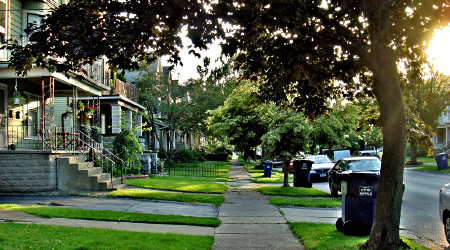Researching And Fighting Neighborhood Associations

Neighborhood associations, which are often referred to as homeowners associations, are nonprofit organizations which residential communities employee to maintain a certain standard of living and to prevent property values from decreasing from negligent homeowners. They do this by collecting dues or fees from homeowners and then use this revenue to maintain landscaping and force covenants per the homeowners association bylaws. They are able to enforce these rules by using legally established guidelines called Covenants, Conditions & Restrictions also known as CCR's.
Roughly 40 million Americans live in residential communities managed by homeowners associations. Homeowners associations are most often associated with first-time home buyer communities and are a means to maintain a certain look and feel consistent with the development. The homeowners in these communities have agreed to share a common expense through association dues to maintain a certain standard of living for the area. This often includes maintaining landscaping, parks and common areas and painting over or removing graffiti. They also enforce the CCR rules to limit what modifications homeowners can do to their property.
This seems contrary to the idea of home ownership and personal freedom. Why would anyone want to live in an area which limits their ability to modify their own property? In reality, for most homeowners this is not an issue. These types of rules, much like the law in general, are to prevent a small minority of individuals from behaving badly and ruining it for everyone else. Every now and then certain homeowners will make modifications in such a way which can decrease property values of the neighborhood or ruin the quality of life for neighbors. It might sound silly but some people make stupid decisions with respect to their property. A homeowner which has hundreds of Christmas decorations in their front yard and feel it's appropriate to leave them up all year long would not be allowed under most homeowner Association guidelines. This is important because if a neighbor is looking to sell their home and prospective buyers see what they could be living next to it can severely impact that homeowners ability to sell the property.
The question is how restrictive a given homeowners association is with respect to what can be done to the property or how it should be maintained. When researching neighborhood associations ask for a copy of the CCR or bylaws and be sure to read them thoroughly to understand what limits are placed on property owners prior to making a purchase. This will go along way towards alleviating misunderstandings and complications later on between the homeowner and neighborhood association. However, if you do move into a community which has a homeowners association there are certain steps that can be taken should there be any confusion or fines imposed regarding the CCR.
Fighting a neighborhood association is probably not the best use of words as "working with" an association can usually go a long way towards alleviating problems. Often when residents want to make modifications to the property which may not be in line with the CCR they can ask for a variance. A variance is a judgment by the board of the homeowners association to allow a one-time use a modification to the property in question. The process is that you go to a homeowners association meeting, present your case and then wait for a judgment. You may or may not be awarded a variance but this is one area where the homeowner can make a modification and still be within the law according to the covenant restrictions.
It is also possible that sometimes restrictions in the CCR are not legally binding but have not yet been challenged. A common situation is homeowners who through some accident or malady require the use of a wheelchair and subsequently require a ramp on the property. This might be in violation of the CCR as designated in the bylaws but will also technically be in violation of the Americans With Disabilities Act. In this situation a variance will probably be granted but if not then a challenge could proceed through the courts. If this however is not the case and it's just a matter of the homeowner wanting to do something they're not allowed to do they could be facing an uphill battle.
Most CCR's are legally binding and upheld by the legal system when challenged in court because homeowners knew what they were getting into prior to purchasing the property or at least should have known. This can make it incredibly difficult to challenge various covenants simply because homeowners do not like them. If however enough homeowners agree on a particular issue they are still in control as most bylaws provide a means for amending for changing various restrictions. Much like any democratic process, rules can be challenged and laws can be changed if an overwhelming majority wishes it to be so. The last resort in fighting a neighborhood association would be using the court system. Not only can this avenue of resolution be expensive and timely but it also may not be beneficial to the homeowner especially if they lose the court case.
Neighborhood associations are not monolithic dictatorships to be overthrown by the people but are merely a reflection of the community's values and priorities which should be respected by all members. The best thing to do is to thoroughly research the Neighborhood Association to understand what the limitations may be and how it may impact your lifestyle. If however you already purchased a home and are unhappy with the restrictions you could always try to work with the association by getting a variance or by changing the restrictions by amending the bylaws. Neighborhood associations exist for the benefit of all residents in the community.







